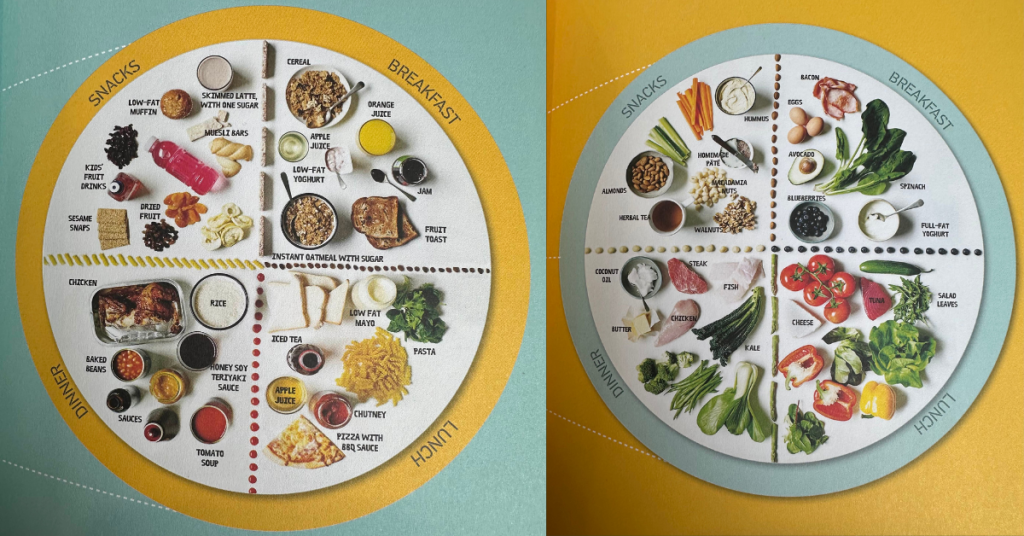
How Much Sugar Are You Consuming?
Sonia Tzerefos
Naturopath, Western Herbalist, GAPS Practitioner
Did you know that the average Australian (including children) consumes around 40+ teaspoons of sugar per day without even trying? All of these sugars are normally hidden in foods that we’re told are healthy and they’re the foods that we feed to ourselves and our kids each day thinking we’re making a healthy choice.
When you look at the image in this blog, the one on the left represents a very common daily diet of a number of patients I treat (especially children) made up of fruit juices, cereals, dried fruit, toast, muesli bars, fruit straps along with many of the sauces our kids love to consume.
Did you know that sauces like BBQ sauce can contain up to 49 grams of sugar per 100 grams – that’s almost 50% of sugar per bottle of sauce.
The one on the right is a representation of what our diet probably should be closer to, with a bit more colour and legumes it would be even better.
Whenever you look at a nutritional label you will see products indicating the number of grams of sugar per serving and per 100grams.
1 teaspoon of sugar is approximately 4 grams so if you see a product that contains 16 grams of sugar per serve (as an example) you are actually consuming 4 teaspoons of sugar in that product.
Some of the below cereals are popular amongst my patients with an indication of the sugar content per serve:
- Kelloggs Sultana Bran – 12.1 grams (or 3 teaspoons) per serve (45 grams)
- Kelloggs Nutrigrain – 9.6 grams (or 2.5 teaspoons) per serve (40 grams)
- Freedom XO Cocoa Crunch – 7.5 grams (nearly 2 teaspoons) per serve (35 grams)
- Uncle Tobys Berry Quick Oats – 6.8 grams sugar (2.5 teaspoons) per serve (40 grams)
Then once you may have considered this for breakfast you might be adding in a glass of apple juice (ranging from 21 grams to 27 grams per 250ml) which is the equivalent of 5-6.5 teaspoons of sugar.
Add in some greek yogurt (ranging from 7 grams to 15 grams per 200 gram serve) and suddenly you may have consumed somewhere between 9-13 grams of sugar before you leave the house.
So what am I trying to say you may be asking yourself.
Sugar is everywhere—in our “healthy” breakfast cereals, hidden in “healthy” drinks and more surprisingly hidden in foods we’d never expect (think bread, takeaway food, pasta sauces, salad dressings and crackers – just to name a few).
The issue is that the way the diet has changed over the years means there is far more sugar being consumed than our bodies are designed to handle. Over time, this excess can quietly harm our health and have long term detrimental effects on our health including:
The Energy Rollercoaster
Sugar is quickly absorbed into the bloodstream, causing a rapid spike in blood glucose levels. This gives us a temporary burst of energy, followed by a sharp crash that leaves us feeling tired, irritable, and craving more sugar…. ever had a “hangry” child. This cycle makes it harder and harder to maintain steady energy throughout the day.
Weight Gain and Obesity
High-sugar diets are strongly linked to weight gain. Excess sugar—especially in the form of sweetened drinks, cereals, “healthy” snacks, pastries, and processed foods—adds empty calories without keeping us full. Over time, this leads to fat accumulation, particularly around the abdomen, which raises the risk of chronic diseases.
Increased Risk of Type 2 Diabetes
Consistently eating too much sugar forces the body to release more insulin to manage blood glucose. Over time, the body may become less sensitive to insulin—a condition known as insulin resistance – which if left untreated can lead us to type 2 diabetes
Heart and Liver Health Risk
Diets high in added sugars are linked to higher blood pressure, inflammation, fatty liver and unhealthy cholesterol levels. Together, these factors increase the risk of heart disease and impaired liver function.
Tooth Decay and Oral Heath problems
Sugar is a feast for harmful bacteria in the mouth. When these bacteria feed on sugar, they produce acids that erode tooth enamel, leading to cavities, gum disease, and other dental problems. Even small amounts of sugary snacks or drinks throughout the day can accelerate this damage.
Tooth Decay and Oral Heath Problems
Sugar is a feast for harmful bacteria in the mouth. When these bacteria feed on sugar, they produce acids that erode tooth enamel, leading to cavities, gum disease, and other dental problems. Even small amounts of sugary snacks or drinks throughout the day can accelerate this damage.
Effects on Mental Heath
Research suggests that diets high in sugar may increase the risk of depression and anxiety. While sugar can trigger a short-term mood boost, it may disrupt brain function, increase inflammation, and interfere with the balance of neurotransmitters over time.
Appointments can be made with Sonia either online or by calling our friendly reception staff on (08) 7231 1628.
Check out Sonia’s Website






